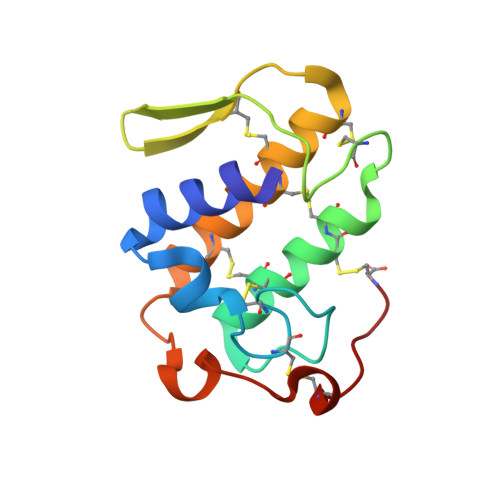Structural evidence for a fatty acid-independent myotoxic mechanism for a phospholipase A2-like toxin.
Salvador, G.H.M., Dos Santos, J.I., Borges, R.J., Fontes, M.R.M.(2018) Biochim Biophys Acta Proteins Proteom 1866: 473-481
- PubMed: 29287778
- DOI: https://doi.org/10.1016/j.bbapap.2017.12.008
- Primary Citation of Related Structures:
6B80, 6B81, 6B83, 6B84 - PubMed Abstract:
The myotoxic mechanism for PLA 2 -like toxins has been proposed recently to be initiated by an allosteric change induced by a fatty acid binding to the protein, leading to the alignment of the membrane docking site (MDoS) and membrane disrupting site (MDiS). Previous structural studies performed by us demonstrated that MjTX-II, a PLA 2 -like toxin isolated from Bothrops moojeni, presents a different mode of ligand-interaction caused by natural amino acid substitutions and an insertion. Herein, we present four crystal structures of MjTX-II, in its apo state and complexed with fatty acids of different lengths. Analyses of these structures revealed slightly different oligomeric conformations but with both MDoSs in an arrangement that resembles an active-state PLA 2 -like structure. To explore the structural transitions between apo protein and fatty-acid complexes, we performed Normal Mode Molecular Dynamics simulations, revealing that oligomeric conformations of MjTX-II/fatty acid complexes may be reached in solution by the apo structure. Similar simulations with typical PLA 2 -like structures demonstrated that this transition is not possible without the presence of fatty acids. Thus, we hypothesize that MjTX-II does not require fatty acids to be active, although these ligands may eventually help in its stabilization by the formation of hydrogen bonds. Therefore, these results complement previous findings for MjTX-II and help us understand its particular ligand-binding properties and, more importantly, its particular mechanism of action, with a possible impact on the design of structure-based inhibitors for PLA 2 -like toxins in general.
Organizational Affiliation:
Departamento de Física e Biofísica, Instituto de Biociências, Universidade Estadual Paulista (UNESP), Botucatu, SP, Brazil.















